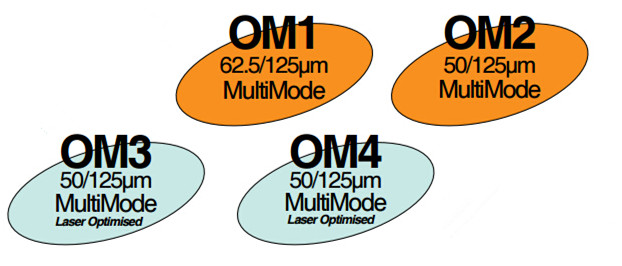How Much Do You Know About OM3 and OM4 Optical Fiber?
For many years, OM1 (62.5/125µm) and conventional OM2 (50/125µm) multi-mode fiber were widely deployed in premises applications. They easily support applications ranging from Ethernet to gigabit Ethernet and their relatively large core size were ideal for use with LED transmitters. With the improvement of network speed and size, modulation rates is up to 10Gbit/s. To meet the needs of 10Gbit/s transfer rate, the ISO/IEC and the TIA jointly draft a new generation of 50μm core multimode fiber standard, which are the laser-optimized multi-mode fiber, OM3 and OM4.

OM3 multi-mode fiber also has a core of 50 microns, but the fiber is optimized for laser based equipment that uses fewer modes of light. Due to this optimization, OM3 multi-mode fiber is capable of running 10 Gigabit Ethernet at lengths up to 300 meters. LEDs have a maximum modulation rate of 622 Mbit/s because they can not be turned on/off fast enough to support higher bandwidth applications. Vertical cavity surface emitting laser (VCSEL) light sources are capable of modulation over 10Gbit/s and are used in many high speed networks. VCSELs become popular in the high-speed networks. Difference between the two light-emitting devices leads to the transformation of optical fibers to adapt to changes in light. The migration to OM3 has occurred as users upgrade to higher speed networks. OM3 optical fiber has an effective modal bandwidth (EMB) of 2000. It is designed for 10Gbit/s transmission.
OM4 optical fiber is a 50µm laser-optimized multi-mode fiber with extended bandwidth. OM4 standards are made to improve the effective modal bandwidth (EMB) and the full bandwidth of the injection (OFL) compared to OM3 optical fiber. It is used in networks where an overwhelming or extreme amount of data needs to be transferred. Like OM3 multi-mode fiber, OM4 optical fiber is also "laser-optimized" or optimized for use with 850nm VCSEL light sources. OM4 optical fiber has a lower insertion loss and an EMB of 4700. It is the preferred technology for the emerging standards that will operate at 40Gbps and even 100Gbps.
OM4 optical fiber is mainly used to support high-speed Ethernet, Fibre Channel (FC) and fiber optic interconnection (OIF). Meanwhile, it can support up to 550 meters in a 10Gbit/s system, so you can use it for building backbone and campus backbone extraordinary distance from the middle. In the data center design, within 100 meters, it can support higher speed (40Gbit/s and 100Gbit/s Ethernet, 16Gbit/s and 32Gbit/s Fibre Channel) data transmission requirements.
OM4 optical fiber was refer to the upgraded version of OM3 optical fiber. OM4 optical fiber standards are made to improve the 850nm wavelength effective modal bandwidth (EMB) and the full bandwidth of the injection (OFL) compared to OM3 optical fiber. Bandwidth standard of OM4 optical fiber is about twice of OM3 optical fiber, you can have greater redundancy construction and design with OM4 optical fiber. For example, when applied to 10Gbit/s system, you can give designers more space, allowing CP link to add more connection points, increasing the design, construction and flexible moves, adds and changes (MACs).
Now with the demand for the development of network transmission, it requires that optical fiber can support future 40Gbit/s and 100Gbit/s transmission. To meet the needs of this development, laser-optimized multi-mode fiber OM3 and OM4, taking advantage of 850 nm VCSEL laser technology to reduce the overall cost, provide you with higher bandwidth choices. Fiberstore (FS.COM) offers a variety of fiber jumpers or fiber optic patch cables, including OM3 multi-mode fiber patch cable assemblies and OM4 multi-mode fiber patch cable assemblies. You can find what you need from us.

